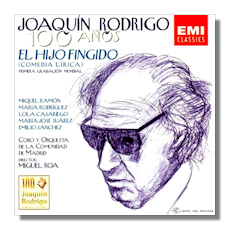
The Internet's Premier Classical Music Source
Related Links
- Rodrigo Reviews
- Latest Reviews
- More Reviews
-
By Composer
-
Collections
DVD & Blu-ray
Books
Concert Reviews
Articles/Interviews
Software
Audio
Search Amazon
Recommended Links
Site News
 CD Review
CD Review
Joaquín Rodrigo

El hijo fingido
- Miquel Ramón, baritone
- Marí Rodríguez, soprano
- María José Suárez, contralto
- Lola Casariego, mezzo
- Emilio Sánchez, tenor
- Carlos López, bass
Chorus & Orchestra of the City of Madrid/Miguel Roa
EMI Classics 57127 78:18
Summary for the Busy Executive: Fairy-tale Spain.
We tend to think of masterpieces as titanic, heaven-storming works that reveal the depths of the human soul, and somehow force things not like that, but which we love, into that definition: Mozart's Le nozze de Figaro comes to mind. I've seen writers twist themselves up in knots or stretch credulity to the breaking point as they try to get that delight through the temple gates. It seems to me the problem lies in our definition. To me, a masterpiece may or may not be conventionally profound, and it all comes down to how well the artist has practiced his craft. Figaro sweeps me along with its dramatic verve, its vivacious melodies, and its elegant solutions (of the Gordian Knot variety) to complex musical problems. If anything convinces me of Mozart's genius, it's Figaro, rather than his soberer works. As Chesterton once pointed out, profundity is easier to pull off than lightness. You can claim profundity for yourself, as long as you can keep a straight face, and who's to tell you different? On the other hand, usually we can tell a good joke from a bad one straight off.
Zarzuela is the national music theater of Spain, a bit like Broadway is to the U.S. It combines music and dialogue and aims for popular appeal. Spanish composer Joaquín Rodrigo had for years felt the pressures of those who expected an opera from him, but he could never find a story that fired him. Finally, one of the 1800 plays by Lope de Vega fell his way, El hijo fingido (roughly, the phony son), spurring him to composition. The adapter/librettist provided a text that struck the composer as unsuitable, and his wife scrubbed it up with passages from other Lope de Vega works. It premièred in the Fifties and seems not to have received another performance until after the composer's death.
The CD apparently comes from the Spanish arm of EMI. I neither read nor speak Spanish very well. The text included with the CD is in Spanish only, so I have only a minimal idea of the plot. This is what I think it's about.
In the prologue, Ensign Leonardo, good-looking and a bit of an operator, returns to Spain from Flanders with an Incan girl (!), Rosita, in tow. They sing of the treachery of lovers, and indeed, by Act I, Rosita has disappeared. Leonardo carries letters of introduction from his commanding officer Captain Fajardo. One of these is addressed to Fajardo's sister, Barbara, a young, pretty widow, whose daughter, Angela, is also young and pretty. Indeed, Angela has at least two foolish, but wealthy suitors. For some reason, perhaps to get a place to crash, Leonardo alters the letter so that it appears that he is the captain's son. Barbara offers him a place in her house, and, predictably, both she and her daughter fall in love with him. He has love scenes with both and maneuvers one against the other, although he seems to be falling for Angela. Barbara tries to cut her daughter out by telling her that Leonardo is actually her own son, and thus Angela's brother. No matrimony is possible. Apparently, it doesn't occur to Barbara that she herself is also off limits. The suitors, knowing of Leonardo's position in the house, try extravagant bribes (with Leonardo's encouragement) to get him to persuade Angela to marry them. Later, Leonardo, in a fit of conscience, runs away but returns to face the music. The captain arrives on the scene to set things straight and dismisses the foolish suitors. Leonardo and Angela will marry. Cheers all around.
There's a hint of Figaro here, or perhaps so many comedies of two young lovers are alike. At any rate, Rodrigo responds with effervescent music, neatly worked. I'd call it "modest" if that didn't sound patronizing. I mean that the music perfectly fits the action. The entire score bubbles and dances lightly on its feet. Rodrigo allows himself to be pulled back once again by the music of the Spanish Renaissance (there's at least one number based on a guitar piece by Sanz), which often roused him to his best. I've read at least one reviewer complain about the lack of interesting tunes in this score, and I have no idea what he means. Rodrigo dependably turned out one great tune after another in work after work. His songs count as some of the finest of Spain. If I really wanted to carp, I might pick out one number, and only one, as not up to the rest, but that might well be someone else's favorite. The only Spanish stage work I know that surpasses it is Falla's El Retablo de Maese Pedro, and that solely due to Don Quixote's final aria. Obviously, I've never seen a production of El hijo and probably never will, unless some enterprising label puts it on DVD, but I'd like to see it. It sounds as if I'd have a great time.
The voices suit this "lyric comedy." It ain't Tristan, after all, and the account in general brings out the lovability of the material. Don't let the lack of English texts and the curious failure to say much about the plot (perhaps the writer thinks it so well known within Spain that he feels free to omit it) put you off. The music alone carries the disc.
Copyright © 2011, Steve Schwartz.




















